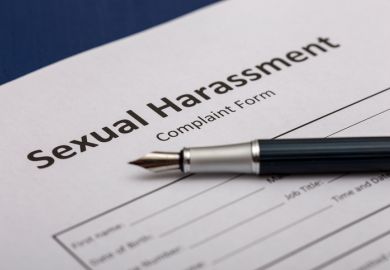A recent BBC documentary on “sex for grades” at universities in Ghana and Nigeria provoked a huge amount of discussion in both countries.
In the BBC Africa programme, broadcast in October, an undercover journalist caught a professor at the University of Lagos and two at the University of Ghana demanding sexual favours from female students in exchange for grades.
Yet the reaction was far from one of universal outrage against the academics. Some commentators, for instance, accused the BBC of exaggerating what they claimed was an isolated problem. But the problem actually appears to be very widespread.
In the same month as the programme was broadcast, I had conversations with 10 female former students of two Ghanaian universities, who now live in the West. All attested that various forms of sexual harassment of students by academics were systemic problems during their time as undergraduates, between 1990 and 2010.
My own spouse, who also went to university in Ghana, was a victim of sexual harassment by a professor, who promised to raise her grade if she succumbed to his advances. Meanwhile, a different lecturer threatened to mark down one of her female friends if she refused to visit him in a private location.
Because you cannot graduate without good grades, it seems that most female university students silently tolerate or yield to such advances; there are even cases where women who spoke out publicly against sexual advances by a male lecturer were given an “F” for the course in question.
The former students I spoke to unanimously agreed that the sex-for-grades phenomenon in universities was just one manifestation of a wider problem in West African society: the tendency of men in high positions to use their authority to reward with material benefits those women who accept their sexual advances, and to penalise those who resist them. Victims include women seeking employment, promotions, government services, bank loans – or admission into higher education institutions.
Some people reacted to the BBC documentary by accepting that there was a problem but shooting the messenger anyway. In the usual refrain characteristic of some African intellectuals, Ghana’s minister of tertiary education, Kwesi Yankah, said in a radio interview that “it shouldn’t take the BBC to tell us that there is sexual harassment in African universities” and complained that Africa “has been stereotyped over the years for everything negative – from corruption to disease to ignorance to poverty. It doesn’t do us any good…I don’t know many stories from the international media organisation that have been positive on higher education in Africa.”
Such comments were a calculated attempt to divert attention from an important, systemic issue affecting the quality of African university education. Complaints about negative journalistic coverage of Africa are not dissimilar to African leaders’ frequent invocation of colonialism, imperialism and international racism to divert attention from internal issues impacting the lives of their populations.
It is also worth noting that local media organisations have failed over the years to report the problem of sex for grades, and African ministers of higher education, including Ghana’s, have been negligent in addressing it. Moreover, if the BBC’s reporting has harmed the reputation of African universities, what about the academics’ sexual predation?
All three of the academics exposed in the documentary have, rightly, been suspended, and investigations into the allegations have been launched.
Both universities involved already have sexual harassment policies in place to protect students. However, what is now needed is a critical, comprehensive review of those policies, at these universities and across the two nations as a whole, to determine how much protection such policies really afford. How fair is the investigation process, for instance? Is legal recourse open to the victims? How assiduously is their identity protected? And how stiff are the punishments for those found guilty?
Sexual harassment in African universities is not a normative cultural behaviour that is immune from external criticism. African women deserve a conducive learning environment to achieve their maximum potential. And if it takes the BBC to provide the impetus to get to grips with the problem, so be it.
Eric Fredua-Kwarteng is an educator and policy consultant in Canada.
POSTSCRIPT:
Print headline: Call out offence, not coverage
Register to continue
Why register?
- Registration is free and only takes a moment
- Once registered, you can read 3 articles a month
- Sign up for our newsletter
Subscribe
Or subscribe for unlimited access to:
- Unlimited access to news, views, insights & reviews
- Digital editions
- Digital access to THE’s university and college rankings analysis
Already registered or a current subscriber?








